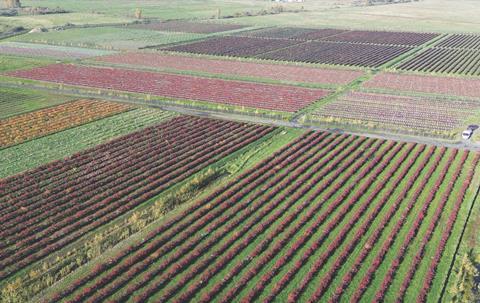Production of cranberries and other berry categories is on the rise at Fieldstone in Poland, driven by growing consumer demand for healthy options
Polish berry group Fieldstone is looking ahead to the coming year with optimism. The family-run company grows raspberries, blueberries, blackberries and redcurrants, but is perhaps best known for its cranberry offering, standing as the biggest producer of the fruit in Europe.

In 2025 Fieldstone will further develop its growing methods and fruit preservation, enhance employee development, and increase production, according to Robert Bełdowski and Ewa Kowalska.
“We plan to grow our raspberries on another 7ha, mostly the Malling Bella variety, but we will be testing new varieties such as Malaika and Serena, which are commercially appealing,” Bełdowski and Kowalska tell Fruitnet.
“At the moment we are very busy organising our brand-new plantation in central Poland where we will focus on blueberries and redcurrants but also organic fruit on a large scale, bringing us 35ha of further production.
“Additionally, we are excited to be the biggest cranberry producer in Europe and we will continue our efforts to master their production process,” they continue.
“Our clients welcomed with great enthusiasm the news that our agronomists developed a technique for cranberries that are biofortificated with iodine and selenium, which are so rare in our everyday diet.”
Fieldstone’s production has steadily increased over the past few years, Bełdowski and Kowalska confirm, as consumer demand for fresh, healthy products has grown.
This has been particularly evident in the company’s export business, and last year 76 per cent of its goods were sent to key markets in the EU.
Fieldstone harvested and handled over 1,000 tonnes of raspberries, more than 600 tonnes of cranberries and over 200 tonnes of blueberries last year, while moving over 100 tonnes of redcurrants.
“The berry business is currently in a strong and positive state,” they explain. “Over the past few years we’ve seen consistent growth in demand for fresh berries, and especially since the Covid-19 pandemic we have observed rapid changes in consumers attitude, becoming more health-conscious and seeking natural, nutritious snacks.”
Customers are looking not only for a great taste but also to source from those producers who add extra value – namely environmental awareness, high labour standards, and preservation that makes fruit safe.
“We are passionate about growing our berries by using biological methods that make our products safe, and this is what we are recognised for,” Bełdowski and Kowalska add.
“In our opinion, those values will fuel the growth of the berry business, especially for those farms that are leaning towards the idea of bio products.”



